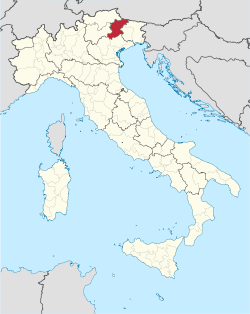Provincia di Belluno
| Province of Belluno | ||
|---|---|---|
| Province | ||
|
||
 Map highlighting the location of the province of Belluno in Italy |
||
| Country |
|
|
| Region | Veneto | |
| Capital(s) | Belluno | |
| Comuni | 69 | |
| Government | ||
| • President | Vittorio Capocelli Prefectural Commissioner | |
| Area | ||
| • Total | 3,678 km2 (1,420 sq mi) | |
| Population (2012) | ||
| • Total | 212,667 | |
| • Density | 58/km2 (150/sq mi) | |
| Time zone | CET (UTC+1) | |
| • Summer (DST) | CEST (UTC+2) | |
| Postal code | 32100 | |
| Telephone prefix | 0437 | |
| Vehicle registration | BL | |
| ISTAT | 025 | |
The Province of Belluno (Italian: Provincia di Belluno; German: Provinz Belluno) is a province in the Veneto region of Italy. Its capital is the city of Belluno.
It has an area of 3,678 square kilometres (1,420 sq mi) and a total population of about 200,000.
The province of Belluno is rather wide, and almost entirely occupied by mountain areas. It encompasses the natural and historical regions of Cadore, Feltrino, Alpago, Val di Zoldo, Agordino, Comelico and Ampezzano. The eastern part of the province features the Dolomites, including the famous Tofane, Marmolada, Tre Cime di Lavaredo and Antelao. The province is rich in water, with the presence of the wide Piave River, with its affluents Boite and Cordevole.
The southern part is called Valbelluna, the widest and most populous valley of the province, which is bordered by the Venetian Prealps. The National Park of Belluno Dolomites is located in the province.
The province of Belluno's climate is among the most severe in the Alps. It is mostly influenced by the continentally, provided by the Dolomites and it is very similar to the eastern Tyrol's climate, or even more severe in the Prealps of the southern side.
The province may be divided in the following climatic zones:
The oldest archaeological find in the province is that of Lagole di Calalzo, in Cadore, belonging to a c. 5th century BC sanctuary dedicated to a health god of Paleoveneti. A larger site, a necropolis, has been excavated in the commune of Mel. Findings from these sites are now housed in the Museums of Pieve di Cadore and Mel.
...
Wikipedia

